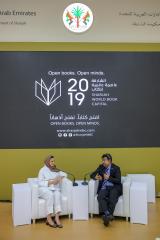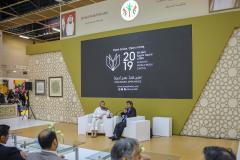Present And Future World Book Capitals Of Sharjah And Kuala Lumpur Discuss Ways To Bring Books And People Closer

The question, “How do we get people to read in an era when technology is crippling our attention spans from going beyond 280 characters?” triggered an interesting discussion yesterday between Sheikh Faisal bin Sheikh Mansor, from Kuala Lumpur (KL) – the city which will be taking the World Book Capital honour from Sharjah next year – and Amira Bin Faris, Special Projects Senior Executive at the Sharjah World Book Capital Office (SWBC Office). The discussion included solutions to bring books to people, and make libraries and printed books relevant in a world increasingly shaped by technology.
Organised by the SWBC Office, the discussion was held on the inaugural day of the Turin International Book Fair (TIBF 2019), where Sharjah is participating as guest of honour. The two speakers got together to tackle questions representing the challenges, not just these two cities, but the world faces in finding ways to present books and information in a way that will be attractive and acceptable to people, especially the new generation.
Highlighting Sharjah’s innovative approach to ensuring people cross paths with books during their daily walks of life, through special initiatives like Knowledge without Borders (KWB), or Kuala Lumpur’s reading campaign for train commuters, Bin Faris asked Mansor, Honorary Secretary, Malaysian Book Publishers Association (MABOPA) and member of Kuala Lumpur WBC 2020 Secretariat, if in his opinion, traditional libraries have become outdated.
“Today, we need libraries to reach out to people and provide them access to content and knowledge, wherever they are,” responded Sheikh Faisal, highlighting that this is part of KL’s WBC 2020 plan, where it will equip public transportation with beacons that allow people to access the city library digitally.
This also answered her question about KL’s approach to technology. “I don’t see technology as a threat; in fact, it plays a big role in society. More and more people have access to technology – it is part of their lives and lifestyles. So, it is very important for those who brings books, information and education to people to be able to quickly adapt. The popularity of audiobooks is a great example. The medium of delivery must be changed and perfected by reproducing it in formats relevant to society,” said Sheikh Faisal.
Bin Faris highlighted that SWBC will focus heavily on ensuring all members of society are considered and included in the programme for the year; she asked her counterpart about their plan to bring books and reading to all segments of the Malaysian community next year.
Sheikh Faisal noted, “Like Sharjah, inclusivity is a highlight of our WBC programme too. Our focus includes people in rural areas, in unfortunate communities – we have the urban poor and the B40 (the lowest 40% of the population based on household income), and people with special needs – to all of whom books are not a priority. Our ambition is to change that; the whole idea of WBC is the promotion of reading.”
While concluding the panel, Bin Faris reiterated that through this discussion, SWBC’s manifested its eagerness to involve representatives from all World Book Capital cities, as well as other cities, to learn about each other’s unique cultural experiences and share best practices; so everyone can collectively further their common goal of getting people to read.


